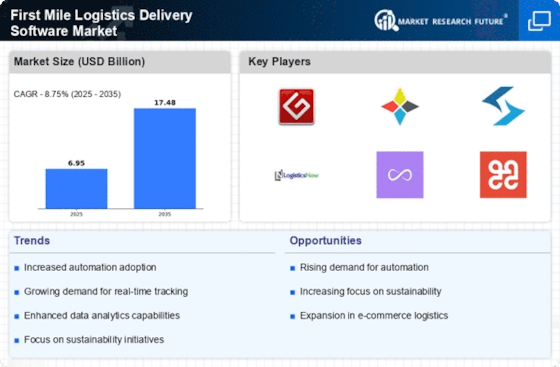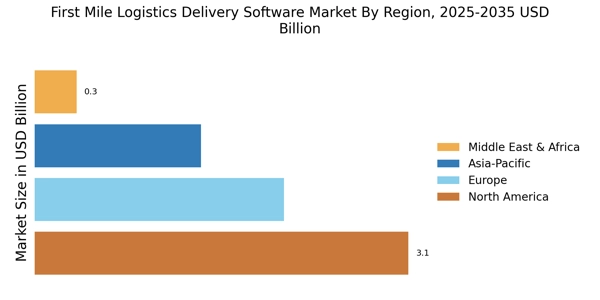Focus on Sustainability
Sustainability has emerged as a pivotal concern within the First Mile Logistics Delivery Software Market. Companies are increasingly adopting eco-friendly practices to meet regulatory requirements and consumer expectations. This shift is reflected in the growing demand for software solutions that facilitate sustainable logistics operations, such as optimizing delivery routes to minimize fuel consumption and carbon emissions. According to recent data, businesses that implement sustainable logistics practices can reduce operational costs by up to 20%. As environmental awareness continues to rise, the emphasis on sustainability is likely to drive innovation and investment in the First Mile Logistics Delivery Software Market, encouraging the development of solutions that align with green logistics principles.
Rising Consumer Expectations
Consumer expectations regarding delivery speed and reliability are at an all-time high, significantly impacting the First Mile Logistics Delivery Software Market. Customers now demand faster delivery times, often expecting same-day or next-day service. This shift in consumer behavior compels logistics companies to enhance their operational capabilities through advanced software solutions. Data suggests that companies that meet or exceed customer delivery expectations can achieve higher customer satisfaction and retention rates. As a result, logistics providers are investing in software that enables real-time tracking, automated notifications, and efficient route planning. The rising consumer expectations thus act as a powerful driver for innovation and investment in the First Mile Logistics Delivery Software Market.
E-commerce Driven Innovations
The rapid expansion of e-commerce has significantly influenced the First Mile Logistics Delivery Software Market. As online shopping continues to gain traction, the demand for efficient logistics solutions has surged. Companies are increasingly seeking software that can streamline the first mile of delivery, ensuring timely and accurate order fulfillment. Recent statistics indicate that e-commerce sales are expected to reach trillions of dollars, further intensifying the need for robust logistics software. This trend is prompting logistics providers to innovate and adapt their services, leading to the development of specialized software that caters to the unique challenges posed by e-commerce. Consequently, the e-commerce boom serves as a critical driver for growth in the First Mile Logistics Delivery Software Market.
Integration of Advanced Technologies
The First Mile Logistics Delivery Software Market is experiencing a notable shift due to the integration of advanced technologies such as artificial intelligence, machine learning, and the Internet of Things. These technologies enhance operational efficiency by optimizing route planning, improving inventory management, and facilitating real-time tracking. As a result, companies can reduce delivery times and costs, which is crucial in a competitive landscape. The market for logistics software is projected to grow significantly, with estimates suggesting a compound annual growth rate of over 10% in the coming years. This growth is driven by the increasing demand for automation and data-driven decision-making in logistics operations, making the integration of advanced technologies a key driver in the First Mile Logistics Delivery Software Market.
Increased Investment in Logistics Technology
Investment in logistics technology is witnessing a significant uptick, serving as a crucial driver for the First Mile Logistics Delivery Software Market. Companies are recognizing the importance of technology in enhancing operational efficiency and customer satisfaction. Recent reports indicate that investments in logistics technology are projected to reach billions of dollars in the next few years. This influx of capital is likely to spur the development of innovative software solutions that address the complexities of first mile logistics. As businesses seek to improve their supply chain resilience and adaptability, the focus on technology-driven solutions is expected to accelerate growth in the First Mile Logistics Delivery Software Market.

















